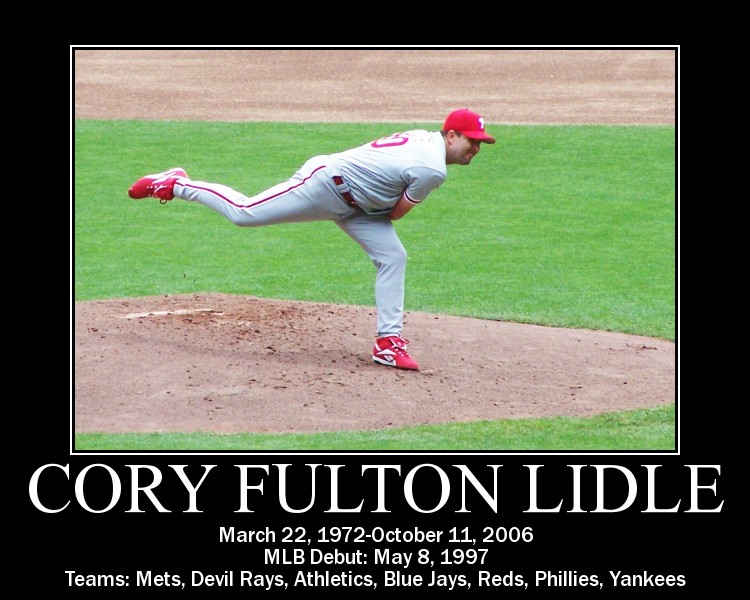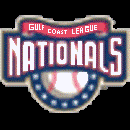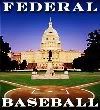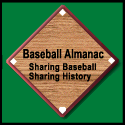Tuesday, October 24, 2006
Left Tackles and You, the story of Michael Oher and a change in the NFL
The author of Moneyball, Michael Lewis, returns with another sports book, this time focused on football (the USA version of the word). Lewis tracks the changing nature of the NFL, and the changing importance of certain positions. As time advanced, and the strategists, mainly Bill Walsh, pushed the organized systematic method of offensive production that increased the average yards per pass, increased the total number of passes, relative to total and to percentage of plays vs. run plays, while at the same time increasing the completion rate. This new method, which has been called by some the “West Coast Offense”, coupled with a new player/management system that allowed free agency, drove one particular position to the forefront.
In the past everyone that played on the offensive line believed himself (apparently) to be playing a position that was not-individualistic, and interchangeable (play Center, Guard, Tackle, left-right didn’t matter). Adding in the lack of measurable production numbers, the pay for players on the offensive line reflected this “through any body in there” mentality. Then things began to change, both with an offensive system that advanced the use of the pass to the point where it became much more feasible to stress the pass over the run and win games, and with advent of the counter to this system. The advanced pass system opened up a new realm of offensive production, but also opened up the quarterback to danger. Why? Because the blockers who would normally be back for the run, are forward as potential targets for a pass (not specifically the same players). This allowed players like Lawrence Taylor to run forward and clobber the QB (though, he likely would have been able to do so anyway, there were just fewer people between him and the quarterback after the change in offensive systems). The position pushed to the forefront by the changes in the game? Left tackle. Why left tackle as opposed to any other position on the field, like say right tackle? Because the left tackle guarded the quarterback’s blind side (right-handed quarterback, and most are right-handed). While the system was in transition, most salaries remained the same for offensive linemen, while an increasing number of quarterbacks became injured, sometimes with career injuries. Then free agency came about, and everyone awaited the avalanche of money to fall on quarterbacks, running backs and wide receivers. Oddly enough, a good portion of this free agent money, though, went to left tackles. GM’s realized that they needed a great left tackle to protect their quarterback, and without one, even the best quarterback will have lower production.
This realization flowed down to the college level (many “lately” “pro”-level offenses), and somewhat down to the high school level. Especially down to one particular kid by the name of Michael Oher. Oher was a gigantic black kid from the poorest area of Memphis when he joined a private high school and began his rise up the social-economic ladder.
Lewis’ book introduces the change in the NFL system and specifically follows Michael Oher’s life up to the present (2006) as a college football player. I enjoy sports, including football, but am most familiar with the inner-workings of baseball. As noted in Lewis’ book, most football fans follow the ball, and pay less attention to the offensive line. This particular book provided me with a great deal of insight into an area of the football field that I had never really considered, and never really understood.
In the past everyone that played on the offensive line believed himself (apparently) to be playing a position that was not-individualistic, and interchangeable (play Center, Guard, Tackle, left-right didn’t matter). Adding in the lack of measurable production numbers, the pay for players on the offensive line reflected this “through any body in there” mentality. Then things began to change, both with an offensive system that advanced the use of the pass to the point where it became much more feasible to stress the pass over the run and win games, and with advent of the counter to this system. The advanced pass system opened up a new realm of offensive production, but also opened up the quarterback to danger. Why? Because the blockers who would normally be back for the run, are forward as potential targets for a pass (not specifically the same players). This allowed players like Lawrence Taylor to run forward and clobber the QB (though, he likely would have been able to do so anyway, there were just fewer people between him and the quarterback after the change in offensive systems). The position pushed to the forefront by the changes in the game? Left tackle. Why left tackle as opposed to any other position on the field, like say right tackle? Because the left tackle guarded the quarterback’s blind side (right-handed quarterback, and most are right-handed). While the system was in transition, most salaries remained the same for offensive linemen, while an increasing number of quarterbacks became injured, sometimes with career injuries. Then free agency came about, and everyone awaited the avalanche of money to fall on quarterbacks, running backs and wide receivers. Oddly enough, a good portion of this free agent money, though, went to left tackles. GM’s realized that they needed a great left tackle to protect their quarterback, and without one, even the best quarterback will have lower production.
This realization flowed down to the college level (many “lately” “pro”-level offenses), and somewhat down to the high school level. Especially down to one particular kid by the name of Michael Oher. Oher was a gigantic black kid from the poorest area of Memphis when he joined a private high school and began his rise up the social-economic ladder.
Lewis’ book introduces the change in the NFL system and specifically follows Michael Oher’s life up to the present (2006) as a college football player. I enjoy sports, including football, but am most familiar with the inner-workings of baseball. As noted in Lewis’ book, most football fans follow the ball, and pay less attention to the offensive line. This particular book provided me with a great deal of insight into an area of the football field that I had never really considered, and never really understood.
Monday, October 23, 2006
No Sweep for the Cards
Entering the World Series, there was much talk of a possible Tigers sweep. Then the Cards won game one. So, sweep for the Cards? Nope, Rogers and his mysteriously brown smudged hands, won game two for the Tigers. Series tied 1-1. Rogers great work smeared by some odd brown substance (see ESPN Photo).
That brown oil smear on Rogers' hand? According to Rogers, it was dirt. Is the dirt especially liquidly in Detroit? Rogers pitched a great game, giving up just two singles and three walks in 8 innings of work, but now because of that mysterious brown sludge on his pitching hand, an asterisk has to be attached to the game. Did Rogers cheat? Did he not cheat? You would hate for the guy to pitch an outstanding game, and get labeled a cheater, if he didn't cheat, but you (whoever "you" is) would hate for him to be able to get away with cheating.
Cheating, of course, isn't new to the World Series, and sometimes the cheating is an attempt to win (Jay Howell, though that was the NLCS, not the World Series; or any overly muscular home-run hitter who has played in the World Series and has the shadow of steroids or the like marring his career ("his", am I being sexist? Unless someone went undetected, even MLB baseball players named Christy are male) or an attempt to lose (see: 1919 Chicago Black Sox, or see the movie "Eight Men Out").
The Reds ended up with a World Series in 1919, but with the public ("say it ain't so Joe") aware that it might have been, should have been, the White Sox World Series victory. If the Tigers win the series, will they be marred by this mysterious brown substance? Will the world continue to argue about the "tainted" Tigers-Cards series 90 years later? Only time will tell.
That brown oil smear on Rogers' hand? According to Rogers, it was dirt. Is the dirt especially liquidly in Detroit? Rogers pitched a great game, giving up just two singles and three walks in 8 innings of work, but now because of that mysterious brown sludge on his pitching hand, an asterisk has to be attached to the game. Did Rogers cheat? Did he not cheat? You would hate for the guy to pitch an outstanding game, and get labeled a cheater, if he didn't cheat, but you (whoever "you" is) would hate for him to be able to get away with cheating.
Cheating, of course, isn't new to the World Series, and sometimes the cheating is an attempt to win (Jay Howell, though that was the NLCS, not the World Series; or any overly muscular home-run hitter who has played in the World Series and has the shadow of steroids or the like marring his career ("his", am I being sexist? Unless someone went undetected, even MLB baseball players named Christy are male) or an attempt to lose (see: 1919 Chicago Black Sox, or see the movie "Eight Men Out").
The Reds ended up with a World Series in 1919, but with the public ("say it ain't so Joe") aware that it might have been, should have been, the White Sox World Series victory. If the Tigers win the series, will they be marred by this mysterious brown substance? Will the world continue to argue about the "tainted" Tigers-Cards series 90 years later? Only time will tell.
Thursday, October 12, 2006
Rest in Peace
Monday, October 02, 2006
Frank Robinson's last game as the Nationals manager
My Videos from the Game:
Robinson's talk with the RFK crowd, Part 1 (Youtube version)
Yahoo Video version (not sure why I can never get videos to work on the blog, no matter, here's a link to the Yahoo Video page that has my video in three parts)
Robinson's talk with the RFK crowd, Part 2 (Youtube version)
Yahoo version:
Robinson's talk with the RFK crowd, Part 3.
Shots taken of that last game:
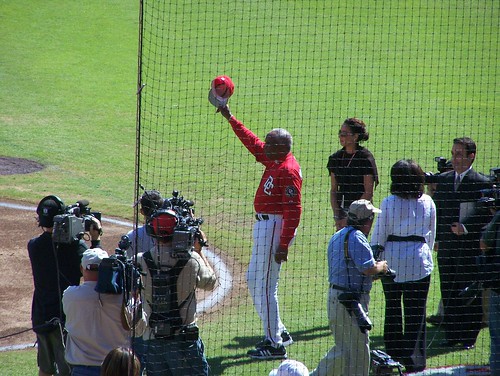
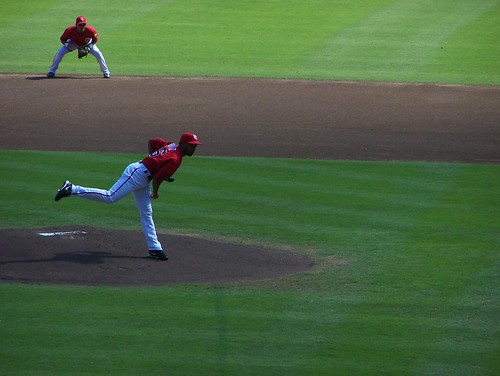 - first pitch by Ortiz.
- first pitch by Ortiz.
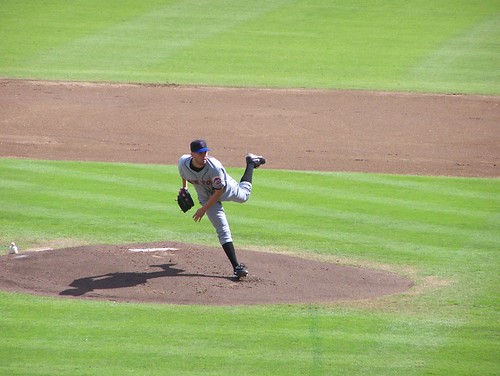 - Perez pitches in the first inning.
- Perez pitches in the first inning.
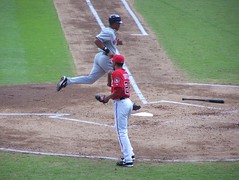 - Franco scores.
- Franco scores.
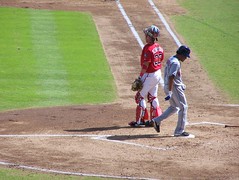 - Hernandez Scores
- Hernandez Scores
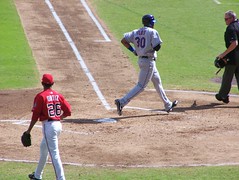 - Floyd scores.
- Floyd scores.
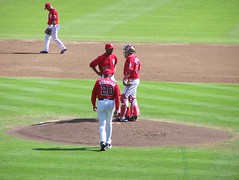 - Ortiz removed.
- Ortiz removed.
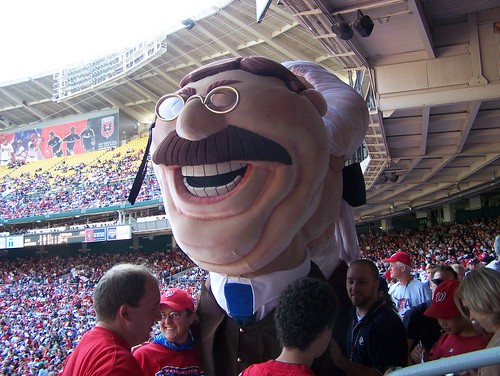 - Teddy walks by.
- Teddy walks by.
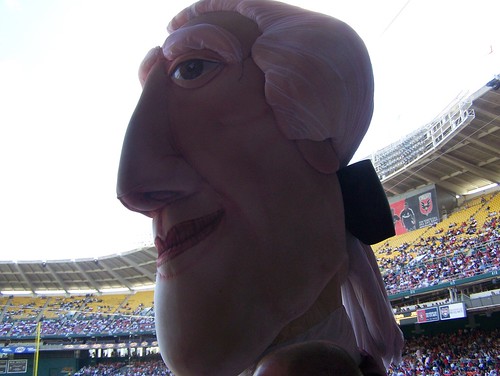 - Jefferson walks by
- Jefferson walks by
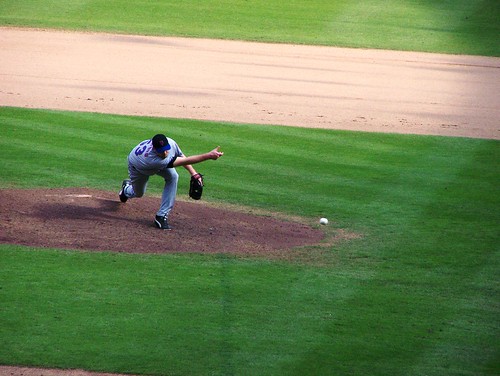
 - Fuzzy out of focus look at the new stadium
- Fuzzy out of focus look at the new stadium
 - new stadium
- new stadium
 - new stadium
- new stadium
 - RFK
- RFK

Robinson's talk with the RFK crowd, Part 1 (Youtube version)
Yahoo Video version (not sure why I can never get videos to work on the blog, no matter, here's a link to the Yahoo Video page that has my video in three parts)
Robinson's talk with the RFK crowd, Part 2 (Youtube version)
Yahoo version:
Robinson's talk with the RFK crowd, Part 3.
Shots taken of that last game:

 - first pitch by Ortiz.
- first pitch by Ortiz. - Perez pitches in the first inning.
- Perez pitches in the first inning. - Franco scores.
- Franco scores. - Hernandez Scores
- Hernandez Scores - Floyd scores.
- Floyd scores. - Ortiz removed.
- Ortiz removed. - Teddy walks by.
- Teddy walks by. - Jefferson walks by
- Jefferson walks by
 - Fuzzy out of focus look at the new stadium
- Fuzzy out of focus look at the new stadium - new stadium
- new stadium - new stadium
- new stadium - RFK
- RFK

